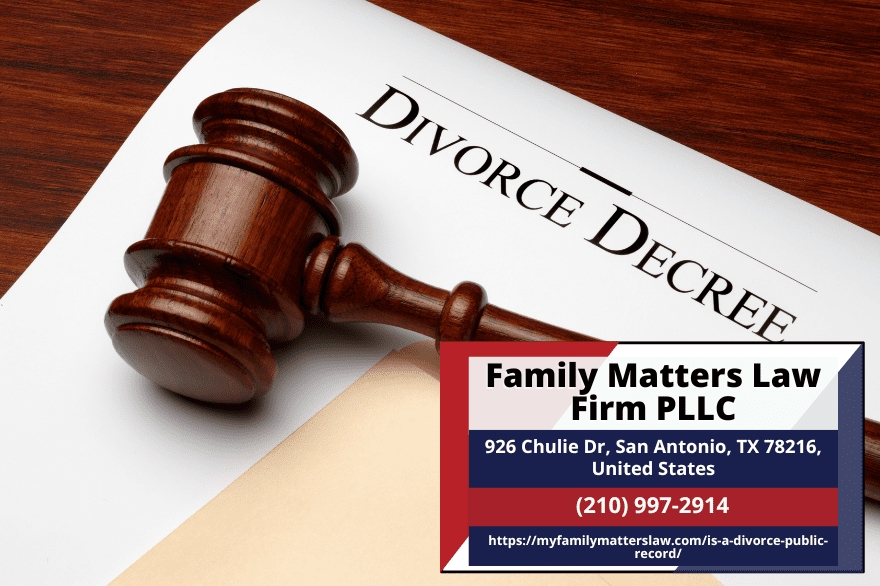San Antonio family and divorce attorney Linda Leeser (https://myfamilymatterslaw.com/is-a-divorce-public-record/) addresses a common concern for many individuals navigating the divorce process: whether divorce proceedings are part of the public record. Divorce filings, decrees, and related court documents can reveal deeply personal information. The availability of these documents to the public often comes as a surprise, especially to those seeking to maintain privacy during a difficult and emotional time.
Linda Leeser, a San Antonio family and divorce attorney at Family Matters Law Firm PLLC, offers clarification on how transparency and privacy intersect in Texas divorce cases. According to Texas law, divorce records are public under the Texas Public Information Act. This transparency supports the fairness of the legal system by making court decisions and proceedings accessible. However, Leeser also highlights the legal avenues available to protect sensitive information, such as motions to seal records or redact certain portions.
From the start of divorce proceedings, it is important for individuals to understand which documents are open to public view. A San Antonio family and divorce attorney like Linda Leeser helps clients identify what information is at risk of exposure and what legal steps can be taken to reduce that risk. This is particularly relevant in cases involving children, financial disclosures, or allegations of misconduct.
Divorce records fall into three categories in Texas: certificates, decrees, and complete records. Certificates serve as simple proof of divorce, while decrees outline the terms of settlement. Complete records include all filings and communications. Basic case facts such as names of parties and court dates are public, but detailed financial statements, child custody arrangements, and sensitive allegations can sometimes be restricted. Linda Leeser emphasizes that privacy concerns must be addressed proactively, ideally with the support of legal counsel familiar with local court procedures.
As stated in the original article, "While core case details are available, more sensitive parts of the record may be shielded from public view upon request." This includes financial statements, custody details, and allegations of abuse. The decision to seal records rests with the judge and requires the requesting party to prove that sealing is in the interest of privacy and that no less restrictive options exist.
Accessing divorce records in Texas can be done in several ways: online through Texas.gov, by mail with required forms and ID, or in person at the district clerk's office. There is a difference between verification letters and certified copies. Verification letters are available to anyone and confirm that a divorce took place, but they do not hold legal authority. Certified copies, often necessary for legal matters or remarriage, are usually limited to the individuals involved in the case or their attorneys.
Reasons for requesting divorce records vary. They may be needed for legal name changes, government documentation, employment benefits updates, or custody modifications. Linda Leeser points out that knowing which type of document is needed, either a simple verification or a detailed decree, can help avoid delays and protect personal information.
While Texas maintains a transparent legal system by keeping divorce records public, the law also acknowledges the importance of individual privacy. Those concerned about public exposure can request that records be sealed. To begin this process, a motion must be filed and a court hearing scheduled. The court then weighs privacy concerns against public interest before making a decision.
Linda Leeser of Family Matters Law Firm PLLC urges individuals to consider legal counsel early in the divorce process. Legal support can help clarify what will appear in public records and guide clients through steps to safeguard their personal details. She encourages those who are worried about their privacy to act promptly and understand their rights under Texas law.
Taking the proper legal approach can help minimize the public visibility of sensitive divorce details. With careful planning and the right guidance, much of the stress and uncertainty surrounding divorce record transparency can be addressed.
Family Matters Law Firm PLLC is committed to providing informed legal support for individuals in San Antonio who are going through a divorce. Linda Leeser’s understanding of how the Texas legal system handles public records helps her clients navigate the process while protecting what matters most to them.
For those facing divorce in Texas and unsure of how public their records might be, a consultation with a San Antonio family and divorce attorney can offer both clarity and direction. Legal guidance not only supports informed decision-making but also provides a pathway to greater peace of mind.
About Family Matters Law Firm PLLC:
Family Matters Law Firm PLLC is based in San Antonio, Texas, and serves individuals and families navigating the legal aspects of divorce and family matters. Attorney Linda Leeser provides legal support focused on clear communication, legal rights, and privacy protection in family law proceedings.
Embeds:
Youtube Video: https://www.youtube.com/watch?v=bTk9DyOupfk
GMB: https://www.google.com/maps?cid=12450537318741950980
Email and website
Email: natalia@sishodialaw.com
Website: https://sishodia.com/
Media Contact
Company Name: Family Matters Law Firm PLLC
Contact Person: Linda Leeser
Email: Send Email
Phone: (210) 997-2914
Address:926 Chulie Dr
City: San Antonio
State: Texas 78216
Country: United States
Website: https://myfamilymatterslaw.com/





